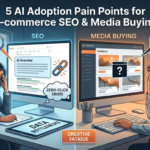Your brand’s personality plays an important role in the success of your business and your customers’ loyalty.
Nowadays, having a good product is no longer sufficient, it’s table stakes. Customers are savvier and looking for reasons to resonate with your brand and what your brand mean in their life. Customers want to spend money with brands that are purpose-driven now more than ever.
10 years go, I was complaining that there were too many everywhere you look; from online dating, consumer products, marketing offers, and others. Today, we have at least 10X that amount of ads being pushed to us through our social pages.

Because of the barrage of brands fighting for your attention and customer-dollars, your brand’s personality to shine and cut through the noise is more important than ever.
And customers care a lot about this. Why, you ask? Because it matters to them — so it should matter to you. Period. No brainer.
Let me ask you a question.
Who’s your favorite quarterback, or soccer star, motivational speaker, or fashion celebrity. Everyone of them have a personality — some more annoying than others, some cockier, some humble, — point is, each of them have their own character.
But you are a fan because you resonate with them — you’re picking up what they’re putting down.
Think of your brand just like that — it has a personality, a voice, an attitude.

Customers follow you if you’re interesting, entertaining, and engaging. They don’t want to guess what your brand stands for. So spare your customer the mystery and let them know what you’re about — always.
If your brand doesn’t resonate emotionally, mentally, and physically with your audience — you’ve already lost the game.
When was the last time you said “Hey, that’s a boring person I could hang out with every weekend!” – NEVER.
There’s one secret that will help you stand out and above all other brands.
Being real and transparent.
Yes, it’s that simple and that’s the truth. I follow certain people tirelessly because they exemplify integrity. They walk the talk and put their money where their mouth is.
Sir Richard Branson (Virgin Group), is someone I admire from a distance. His approach to life, work, employees, and everyone around him is worth striving for. His positivity is contagious.

John Legere (T-Mobile) is someone who is so real that he’s willing to put himself in the line of fire.
He’s very active in engaging with customers on Twitter and continuously amazes me how resourceful he is in finding time to nurture his employees and customers.

They are the epitome of building a purpose-driven brand.
While I wouldn’t call them celebrities in the “Hollywood” sense, their engagement with the community, employees, social networks, etc — is something that many CEOs and leaders should look up to.
They are building an organization that is worthy of their employees.
Similarly, your brand’s personality extends beyond your tone and voice. It’s about what you do when no one is looking, it’s what you say when all eyes are on you, and it’s how you react when shit hits the fan.
Brand personality is the big draw to get customers to pay attention to you, listen, and tell others about your story.
Below are a five pointers that will help mold your brand into a likable entity.
How do you even build your brand’s personality?
1. Honesty shapes your personality
Out of all of the behaviors that consumers want from brands on social media, honesty is #1.
People don’t want to follow a brand that’s dishonest or puts out incorrect information.
Many brands in the past, current, and probably future — will get caught in scandals about their products and corporate governance. Those are brands that lose relevance and fandom will likely fade away in a few years.
There’s no such thing as partial transparency.
As a brand, you cannot cherry-pick what you want to be honest about.
Of course, there are legal and financial information that must remain private to the company. But there are many things that your organization can be transparent and honest about with your consumer.

Let’s walk through a real life example. We all buy shampoo. At least I hope we all do 🙂
How would you feel if the brand that sold you your organic shampoo you bought for your children did not provide a complete list of ingredients they used, or conveniently leave out certain chemicals on their label? Or if your favorite vegan restaurant did not disclose the what they’re serving you.
I don’t think you’ll like either scenarios mentioned above. Nobody would. That’s deceit. No matter how your try to spin it — withholding information from your customer is an outright deception.
People look for transparency in brands, similar to how they look for transparency and honesty in people.
Why would they want to give a brand their money if they aren’t honest? If you are, then you might be the rare person who likes being bamboozled.
Always make sure that the message and content your company is putting out is 100% true to the brand.
Falsifying information, facts or stories will hurt your brands image in the long-game and it will cause you to lose customers who would have been loyalist.
2. You’re allowed to be funny, but be tasteful
If you’ve seen the video from The Dollar Shave Club, you might have noticed their cavalier approach. We’re talking about a billion dollar industry – shaving – that they are trying to compete in. Yet, DSC has chosen the less serious route to launch their brand and make it their message.
Why did they take that risk?
Well, to the DSC team, this wasn’t a risk. It was their opportunity to showcase their brand’s personality through their humor.
Customer flocked to DSC not because of cheaper shavers — people who shave all around the country took the chance on DSC products because their message and approach resonated with the audience; it was rebellion against the monolithic — they just happen to be cheaper than the big brands.
Incorporating humor into your brands message should always be taken not too carefully and also not too carelessly.
But here’s something important that you need to remember.
Finding the right balance of humor that makes your consumers chuckle but doesn’t offend them or make their eyes roll is sometimes a difficult challenge, which is why a lot of brands tend to avoid it.
Some brands create tastefully funny captions on social media posts using puns and play on words to help inject humor.
Using memes or relatable feelings such as a dog on his back with the caption, “Monday’s be like” — help to make your brand relatable and also incorporate some light humor into your personality.
The purpose of adding humor to your brand’s voice could can ease people into your brand – allowing you to communicate your message to meet your customers where they’re at.
3. Your responsiveness contributes to perception of your brand
We all have that friend who you call and doesn’t pick up or send a text to — then calls you back or reply one day later. As funny as this example is to me, I am guilty of that as well…our responsiveness does contribute to our brand — personal or corporate.
With our attention glued to smartphones, we expect instant responses once we have hit the send button.
If we don’t get a text back within seconds, something must be wrong! Right?
Timing is everything. So many brands dive into social without realizing they’ve just opened up the flood gates to prompt engagement.
When brands come to us to launch their social media campaigns, one of the things we ask is how much resources and time is dedicated to their social engagement. Some like to exaggerate theirs, but we can always draw our own conclusion by just spending a few minutes on their social pages. And most are not as engaged as they say they are – no surprises there.
You get your customers to love your brand when you are responsive and timely with all interactions they have with your brand. It also helps you amplify your brand. Here’s why.
If your customer posts a question about the shoe you’re selling, chances are there are many other followers on your page wondering the same question. So by responding to one person, you have demonstrated that you are paying attention, you care, and you’re reaching other customers you may not know about.
Customers want the brand they are going to follow and spend money on to care about what they have to say.
4. Choosing where to showcase your personality matters
This is an important part to shaping your brands personality; where to showcase it.
The right platform will give you the best shot to connect your brand’s personality to the largest, relevant, and engaging audience.
Certain platforms just work better for some brands. B2B companies would most likely focus on LinkedIn first, before going on Facebook.
A fashion brand might focus on Instagram or Pinterest to showcase their products, and not worry about LinkedIn.
The idea is to find a healthy mix of social platforms to voice your brand’s vibes. Let’s say you are selling women’s shoes online, your posts of Instagram or Pinterest are focused on images and lifestyle shots.
But since your customers engage with content across multiple platforms you need to implement a more holistic social strategy. And you do this by posting appropriate, relevant, and timely content and stories about your brand on everywhere.
REI is one of my favorite brands that have a solid grip on social media and how they create and customize their message to each platform; Facebook, Instagram, and LinkedIn.
REI’s Instagram page is a perfect example of how brands should focus more on lifestyle than their products. Customers do not need your to shove products down their social feed. There’s already enough brands trying to do that.

Instead of telling you how great their products are, REI chose to capture real life stories of their products in use — brilliant! And Instagram is the perfect channel for these amazing captured moments.
REI’s LinkedIn page on the other had focuses on their social impact stories.
The same Instagram audience will spend time on LinkedIn, but there’s a major difference — state of mind. When the same person is on LinkedIn, they are focused on stories and social impacts REI is a part of. The company page is the best place to showcase their efforts.

Seeing content like sends a more serious message about REI’s commitment and involvement to social good, compared the playful imagery on Instagram that tells a different story — one of fun and delight of being outdoors.

REI’s Facebook page is full of information their audience will find useful – especially their upcoming events. Unlike Instagram or LinkedIn, Facebook is one of the most practical social platforms for your brand to keep your audience informed about events.

Additionally, REI shares amazing stories on their Facebook page. Unlike the feel-good stories they post on the company LinkedIn page, these are stories that are more inspiring. Like Alex’s story about his life and climbing El Capitan – inspiring and uplifting!

Brands who only focused on one social platform will lose the opportunity to really connect and engage with their audience.
Here’s a reminder and practical tip for your social content strategy.
Create relevance with your audience.
It’s harder now to maintain a consistent voice across social networks, but it’s also the one thing that separates your brand from everyone else.
If you do nothing else, this is one of the most important things you can for your brand.
Take notes on which platforms are the most important to them when it comes to having your brands personality shine through.
Monitoring your metrics like reach and engagement. These are by far the most important indicators of how well your customers are in favor of the content you’re sharing.
Facebook remains the most important platform for consumers when it comes to brands and products, followed by YouTube, Twitter and Instagram.
By focusing mainly on these platforms and choosing which content is the best for each individual avenue, you will be able to develop your brands personality to best cater to and reach your consumers.
5. Walking the line between cool and annoying
Sometimes a brand can overdo it with the personality aspects and end up annoying customers, causing bigger ramifications than just an eye roll.
Your customers will distance and disassociate themselves with your brand if they find you are becoming a nuisance to their social feed — keep this in mind, social engagement is akin to real life for tens of millions of people.

At the end of the day, you are a customer too. So the litmus test is if you are annoyed by similar content someone else is creating, then chances are you will annoy your customers with the same content. There is one caveat.
If “annoying” aligns with your brand voice — then the world is your oyster. Otherwise, please reconsider your content strategy.
Conclusion
Developing your brands personality help you shape your digital platforms into a brand that people want to follow and interact with.
You become their go-to brand. That’s the ultimate ROI.
Gaining the trust of your customers through your brand personality will help your fuel your audiences’ growth.
Remember this.
At all costs, avoid dishonesty and annoyances that cause people to turn away from your brand. Keep it honest and your customers will stay loyal.





